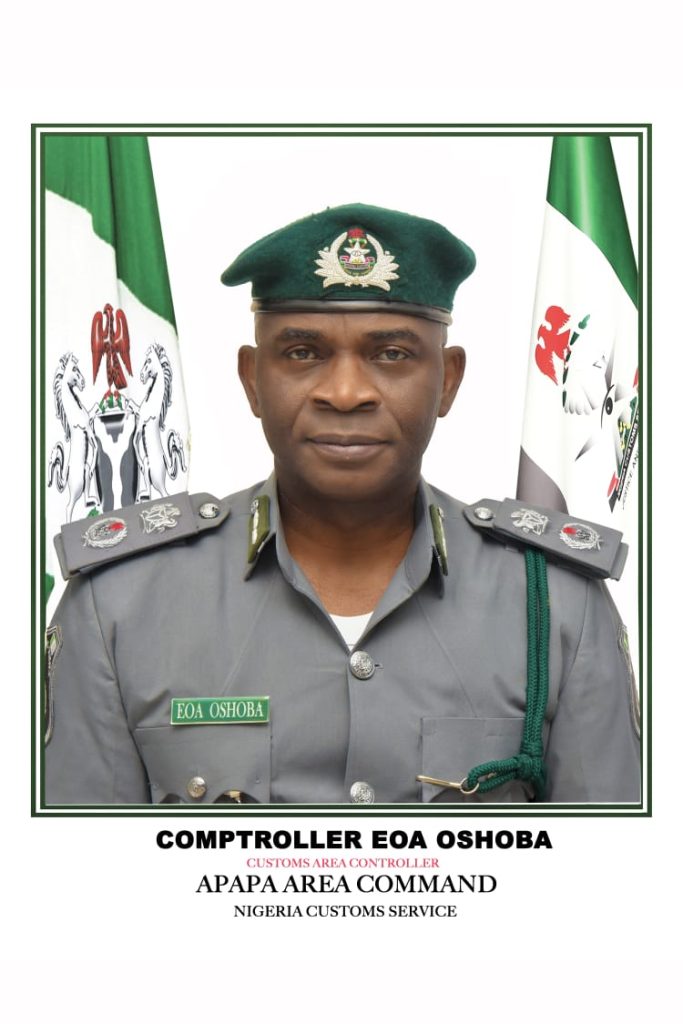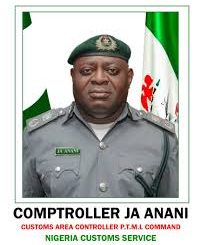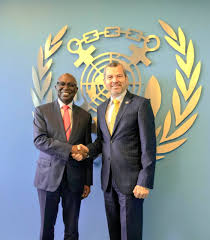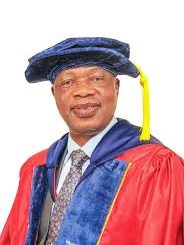By Stephen Ubanna
Those who think that the B’Odogwu, an indigenous technology developed by Nigerian Customs personnel to replace the Nigerian Integrated Customs Information System (NICIS II), a foreign technology, was a setback to the country’s import and export procedures may have to rethink.
Compt. Frank Okechukwu Onyeka, Area Controller, Tin Can Island Area Command, was said to have told those who cared to listen that the system has come to stay, urging importers and their agents to embrace it and do the needful by opening their containers for examination whenever necessary to avoid running into the hands of Customs personnel at the terminal.
Until his deployment to the Command last December, the situation at the Apapa Command, according to informed sources, was very worrisome, as many traditional and big-time importers had relocated there because of better service delivery. Some major vehicle importers and dealers who could no longer find it worthwhile to use the Five Stars Vehicle Terminal at the Tin Can Island Port because of poor services and high-level extortion were forced to relocate to the Port and Cargo Multi-Services Terminal Limited (PTML) to take delivery of their vehicles.
Bringing his experience to bear in his new office as the Tin Can Area Controller, and knowing fully well that he has no excuse to give Bashir Adewale Adeniyi, the Customs Comptroller General, for not meeting the N1.5 billion revenue target set for the Command from Customs’ total budgetary figure of N6.5 trillion compared to Apapa Command’s N3 trillion, may have forced the no-nonsense Compt. Onyeka, who has barely two years in the NCS, to go all out to woo the run-away importers and their agents. These are people who had known him as a one-time officer at the Apapa Command exit gate and had enjoyed his services because of his no-delay policy, as long as an importer’s agent could show proof that the container had been examined at the terminal by the NCS personnel and other relevant security agencies, including the Department of State Services (DSS).
It was not surprising that most of the Tin Can Island Port’s traditional importers and their agents had staged a comeback to the port to take delivery of their cargoes, making it now capable of competing with Apapa Port, which handles over 60 percent of the country’s imports.
Compt. Onyeka’s efforts to bring back some of Tin Can Island Port’s customers appear to have paid off. This is evident as the Tin Can Island Command, which oversees the port’s imports and exports, could collect a daily revenue of N16.4 billion. The Customs Comptroller, who had succeeded in blocking all areas of revenue leakage, could beat his chest that the huge amount collected by the Command in one day in August was a fallout of the effective deployment of B’Odogwu under the Trade Modernization Project (TMP).
An informed source told The Value News Online Magazine of an instance where the CGC had called the Tin Can Area Controller on a Sunday regarding a vehicle import that needed to be revisited. Given the urgency of the CGC’s directive, coupled with the fact that the Command’s valuation officer had traveled for the weekend to Kwara, his home state, the revaluation of the imported vehicle and its subsequent release might have been delayed. With the B’Odogwu facility, the job was routed to the TIC, and their system promptly opened without the need to see the valuation officer to facilitate the vehicle’s release.
Many believe this is something that could never have happened under the old NICIS arrangement. It is not surprising that there are people who had benefitted from the over 20-year-old system and are determined to sabotage B’Odogwu at all costs.
While Compt. Onyeka has taken advantage of the B’Odogwu facility to improve Tin Can Island Command’s operations and daily revenue generation, his counterpart at the Apapa Command, Compt. Emmanuel Oluwadare Oshoba, knows he has a big task ahead to sustain the Command’s revenue track, notwithstanding the lapses of the B’Odogwu facility.
Given that most of the experienced hands overseeing the Command’s strategic units had either retired from the Service after attaining the mandatory 35 years or 60 years of age, or had been promoted to the enviable rank of Comptroller and deployed to Customs Headquarters or Zonal Commands to head new positions, Compt. Oshoba has had to work with a new crop of senior officers.
This may have informed why the Customs Comptroller, who is not ready to take any excuse for non-performance from the newly appointed DCs, ACs, and other senior officers deployed to terminals supervised by the Command, has urged them to sit up.

As a prelude to ensuring their success in their assignments, Compt. Oshoba, who has less than two years to retire from the Service, was said to have urged the Command’s newly promoted senior officers, particularly the DCs and ACs, to embrace innovation, integrity, and continuous learning as they assume higher responsibilities within the Service.C
Taking a cue from Compt. Onyeka of Tin Can Island Command, who had already conducted a training program for newly promoted officers, Compt. Oshoba, who had served as Comptroller of the Customs Intelligence Unit (CIU) at Customs Headquarters, Abuja, could not hide his feelings. He was said to have congratulated the officers on their career advancement, describing their promotion as both a reward for hard work and a call to greater service.
Speaking in his capacity as the Area Controller of Apapa Command and Head of the Management Team, he reminded the newly promoted senior officers that their new ranks come with increased expectations from the Service and the nation, urging them to exhibit excellence, discipline, and commitment to the modernization vision of the incumbent CGC, Adeniyi.
According to the Customs Comptroller, elevation to new senior ranks comes with benefits, challenges, and responsibilities. He may have spoken the mind of the CGC when he stated that Management demands more commitment, innovative thinking, and unwavering dedication to excellence in carrying out the CGC’s agenda of coordination, innovation, and consultation.
Highlighting the Service’s transformation drive over the last two years or thereabout, the Apapa Command Area Controller noted that Customs operations across the country have become more knowledge-driven, with modernization initiatives such as the Advance Ruling System (ARS), Time Release Study (TRS), Authorized Economic Operator (AEO), and the One-Stop-Shop mechanism defining trade facilitation in Nigeria.
He tasked the Apapa Command’s newly promoted senior officers to familiarize themselves with these trade tools and deploy them effectively to enhance efficiency, compliance, and risk management.
He also alerted the officers to cases of non-compliance by traders, either out of ignorance or deliberate circumvention of the country’s import procedures, which is a call for them to sit up and ensure the smart use of B’Odogwu technology for risk assessment.
Given his determination to meet and surpass the Command’s N3 trillion 2025 revenue target at all costs, he urged the officers to take advantage of training for professional development, to interact, exchange ideas, and build networks that will strengthen teamwork and leadership capacity across Commands.
Appealing to the DCs and ACs entrusted, and those who would still be entrusted, with sensitive duties in the Command, including custodianship of release passwords and supervision of junior officers, he urged them to uphold the tenets of justice and honesty, which are the core values of the Service.
He may have gladdened the hearts of the officers when he stated that capacity building remains one of the major priorities of the present Customs leadership, stressing that continuous training forms part of the long-term strategy for institutional excellence.
The training session, hosted at the Apapa Command operational base, according to an insider, aims to equip the newly promoted officers with advanced knowledge and leadership skills essential for driving Customs modernization and effective trade facilitation.







